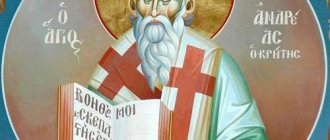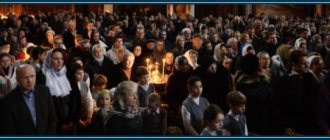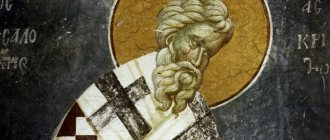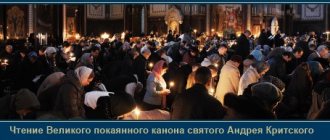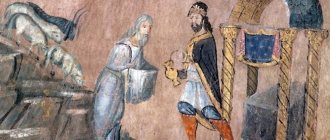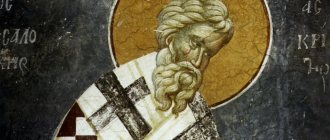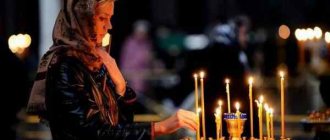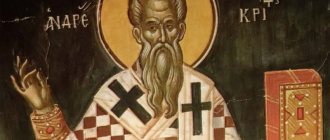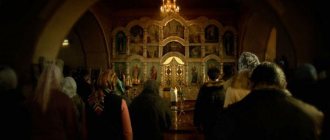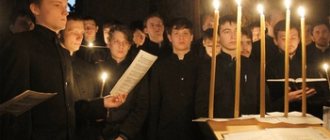In the first four days of Great Lent, the canon of St. is read at the evening service. Andrey Kritsky . The Great Canon of Andrew of Crete is a miracle of all church hymnography; these are texts of amazing power and beauty. It begins with a text addressed to Christ: “Where will I begin to cry over my accursed life and deeds? Shall I make a beginning, O Christ, for this present mourning?” - where should I start to repent, because it is so difficult.
“Go, damned soul, with your flesh. Confess to the Creator of all…” - amazing words, here is both Christian anthropology and asceticism: the flesh must also participate in repentance, as an integral part of human nature.
Text of the Great Canon of Andrei Kritsky, translation, AUDIO
Full text of the Great Canon of St. Andrew of Crete
Download the canon of Andrei Kritsky in formats
- EPUB,
- FB2,
- MOBIPOCKET
- HTML
- Canon of Andrew of Crete on Monday of the first week of Lent (text + audio)
- Canon of Andrew of Crete on Tuesday of the first week of Lent (text + audio)
- Canon of Andrew of Crete on Wednesday of the first week of Lent (text + audio)
- Canon of Andrew of Crete on Thursday of the first week of Lent (text + audio)
- Canon of Andrei Kritsky. Mariino's standing (+ Audio + Video)
Recordings of the reading of the canon of St. Andrew of Crete
- The Great Canon of Andrew of Crete - reading at Sretensky Monastery (AUDIO)
- The Great Penitential Canon of Andrei of Crete - read by Metropolitan Philaret of Minsk (AUDIO)
- The Great Canon of Andrew of Crete - read by Patriarch Pimen (AUDIO)
Translating to Russian language
- Canon of St. Andrew of Crete translated by Metropolitan Nikodim (Rotov)
We analyze the text of the canon - interpretation of difficult passages
- According to the pages of the canon of St. Andrey Kritsky - article by philologist L. Makarova
Reflections on the pages of the canon
- Bishop Veniamin (Milov) Edification according to the “Great Canon” of St. Andrew, Archbishop of Crete
- Protopresbyter Alexander Shmeman Lenten pilgrimage - Great Canon of Andrew of Crete
- Nun Ignatia (Petrovskaya) The place of the Great Canon of St. Andrew of Crete in the hymn-making heritage of the Church
- Hieromonk Dimitry Pershin About the canon of Andrei Kritsky, aliens and brands of refrigerators (conversation + video)
- Archpriest Nikolai Pogrebnyak The Great Canon: history and iconographic parallels (reading the canon through icons)
- Olivier Clément The Canon of Andrei Kritsky - the awakening of the soul
- Archpriest Sergius Pravdolyubov About Saint Andrew of Crete and his Great Canon
- M.S. Krasovitskaya Through the pages of the Great Canon of Andrei Kritsky. Lent
Canon of Andrei Kritsky in art
- Canon of Andrei Kritsky - song of Hieromonk Roman (Matyushin) ! Recommended (AUDIO)
- The penitential canon of St. Andrew of Crete in a poetic arrangement by priest Gabriel of Pakatsky
- Anna Akhmatova I listened to the canon of Andrei of Crete in this church...
Sermons after the canon of St. Andrew of Crete
- Archpriest Valentin (Amphiteatrov) Sermons for the first week of Lent
- Hieromartyr Hilarion (Trinity), Archbishop of Vereisk About wisdom. Reflection on two troparions of the Great Canon of Andrew of Crete
- Archimandrite Kirill (Pavlov) Sermon on Tuesday of the 1st week of Great Lent after Great Compline About fasting and its benefits
- Homily for Wednesday of the 1st week of Great Lent after Great Compline On fasting and repentance
- Homily on Thursday of the 1st week of Great Lent after Great Compline About fasting and its meaning
Canon of St. Andrey Kritsky on THURSDAY + audio
Peace be with you, dear visitors of the Orthodox website “Family and Faith”!
On Thursday of the 1st week of Great Lent, the last part of the Great Penitential Canon of St. Andrew of Crete is read.
Those of you who will not be able to visit the temple and attend the evening fast service can listen to the audio recording with the reading of the Canon, which was made in the Moscow Sretensky Monastery on Thursday of the first week of Great Lent.
Two beautiful male choirs - the Choir of the Sretensky Monastery and the choir of the Sretensky Theological Seminary - will fill your mind with beautiful spiritual chants, and the spiritual reading by Archimandrite Tikhon (Shevkunov) of the deep words of the Canon will fill your heart with quiet repentant grace...
To the section – “Great Lent” >>
Text of the Great Canon of Repentance, read on THURSDAY
Canto 1
Irmos: This is my God, Helper and Protector, and I will glorify Him, God of my Father, and I will exalt Him: gloriously have I been glorified.
Chorus: Have mercy on me, God, have mercy on me.
Lamb of God, take away the sins of all, take away from me the heavy burden of sin, and, as you are gracious, give me tears of tenderness.
Have mercy on me, God, have mercy on me.
I bow down to you, Jesus, those who have sinned, cleanse me, take away the heavy burden of sin from me and, as you are gracious, give me tears of tenderness.
Have mercy on me, God, have mercy on me.
Do not go into court with me, bearing my deeds, seeking words and correcting aspirations. But my fierce one despises Your bounties, save me, O All-Powerful One.
Have mercy on me, God, have mercy on me.
The time of repentance, I come to You, my Creator, take away from me the burden of heavy sin and, as you are gracious, give me tears of tenderness.
Have mercy on me, God, have mercy on me.
Having spent spiritual wealth through sin, I am empty of pious virtues, but gladly I cry: Lord, giver of mercy, save me.
Chorus: Reverend Mother Mary, pray to God for us.
Having bowed to the Divine Law of Christ, you began to do this, abandoning uncontrollable desires for sweets, and you reverently, as if alone, corrected every virtue.
Glory: Presence of the Trinity, worshiped in Unity, take away from me the heavy burden of sin and, as you are gracious, give me tears of tenderness.
And now: Mother of God, Hope and Intercession of You who sing, take away from me the heavy sinful burden, and, like the Pure Lady, repentant, accept me.
Song 2
Irmos: You see, you see, for I am God, who rained manna and brought forth water from stones of old in the desert by My people, by My one right hand and by My strength.
Have mercy on me, God, have mercy on me.
He killed a husband, he says, as a wound to me, and a young man as a scab, Lamech, weeping and crying; You do not tremble, O my soul, having calcified your flesh and desecrated your mind.
Have mercy on me, God, have mercy on me.
Thou hast wisely created a pillar, O soul, and set up a foundation by thy lusts, had not the Creator withheld thy counsels and cast down thy devices to the earth.
Have mercy on me, God, have mercy on me.
About how jealous Lamech, the first murderer, was jealous of his soul, like a husband, his mind, like a youth, like my brother, killing his body, like Cain the murderer, with lustful aspirations.
Have mercy on me, God, have mercy on me.
The Lord sometimes rains fire from the Lord against iniquity, burning the Sodomites; You have kindled the fire of Gehenna, in it imash, about the soul, burning.
Have mercy on me, God, have mercy on me.
Vulnered, wounded, behold the arrows of the enemy, which wounded my soul and body; behold, these scabs, festerings, darknesses cry out, the wounds of my self-willed passions.
Chorus: Reverend Mother Mary, pray to God for us.
You stretched out your hands to the generous God, Mary, plunging into the abyss of evil; and like Peter, the humane hand of the Divine extended your appeal in every possible way.
Glory: Beginningless, Uncreated Trinity, Indivisible Unity, accept me when I repent, save me when I have sinned, I am your creation, do not despise me, but have mercy and deliver me from my fiery condemnation.
And now: Most Pure Lady, Mother of God, the Hope of those who flow to You and the refuge of those in the storm, the Merciful and Creator and Your Son, propitiate me with Your prayers.
Song 3
Irmos: Establish, O Lord, my heart, which has moved upon the rock of Your commandments, for You alone are Holy and Lord.
Have mercy on me, God, have mercy on me.
Hagar of old, the soul of the Egyptians, you became like, enslaved by will and giving birth to a new Ismail, contempt.
Have mercy on me, God, have mercy on me.
Thou didst understand Jacob's ladder, my soul, which is revealed from earth to Heaven: why didst thou not have the rise of firmness and piety.
Have mercy on me, God, have mercy on me.
The priest of God and the king is alone, imitate the likeness of Christ in the world of life.
Have mercy on me, God, have mercy on me.
Turn, lament, the damned soul, before the end of life will not even accept the triumph, before even the door of the palace will not be closed by the Lord.
Have mercy on me, God, have mercy on me.
Do not wake up the glorious pillar, when your soul returns, let the image of Sodom frighten you, save yourself from grief in Zoar.
Prayers, Master, do not reject those who sing to You, but be generous, O Lover of mankind, and grant by faith to those who ask for forgiveness.
Glory: To the Trinity, Simple, Uncreated, Originless Nature, sung in the Trinity by the Hypostasis, save us, who worship Thy power by faith.
And now: From the flightless Father, in summer, to the Mother of God, you gave birth to the Mother of God, a strange miracle, the Virgin remained milking.
Song 4
Irmos: The prophet heard Thy coming, O Lord, and feared, for Thou wouldst be born of a virgin and appear as a man, and said: I heard Thy hearing and feared, glory to Thy power, O Lord.
Have mercy on me, God, have mercy on me.
The time of my life is short and full of illnesses and wickedness, but in repentance, accept me and call me to reason, so that I will not covet or covet a stranger, O Savior, be generous to me.
Have mercy on me, God, have mercy on me.
Royal dignity, a crown and scarlet garments, a man of many names and a righteous man, boiling with wealth and flocks, suddenly deprived of wealth, the glory of the kingdom, impoverished.
Have mercy on me, God, have mercy on me.
If he were righteous and blameless above all others, and would not escape the snare of the flatterer and the snare; But you, sin-loving being, damned soul, what will you do if something happens to you from the unknown?
Have mercy on me, God, have mercy on me.
Now I am lofty in words, but cruel in heart, in vain and in vain, so that you do not condemn me with the Pharisee. Above all, grant me the publican’s humility, the One Generous Justice, and count me with this.
Have mercy on me, God, have mercy on me.
Those who have sinned, having annoyed the vessel of my flesh, be generous, but accept me in repentance and call me to reason, so that I will not acquire covetousness to a stranger, O Savior, be generous to me.
Have mercy on me, God, have mercy on me.
I would have been self-immolated by passions, harming my soul, Generously, but in repentance accept me and call me to reason, so that I will not acquire covetousness to a stranger, O Savior, be generous to me.
Have mercy on me, God, have mercy on me.
I did not listen to Thy voice, I disobeyed Thy Scripture, the Lawgiver, but in repentance accept me and call me to reason, so that I will not be greedy for someone else, O Savior, be generous to me.
Chorus: Reverend Mother Mary, pray to God for us.
Having descended into the depths of great voids, you were unpossessed; but you rose with the best thoughts to the extreme manifestation of virtue, gloriously, angelic nature, surprising Mary.
Glory: Undivided in Being, Unfused in the Person of the theologian Thee, the Trinity One Divinity, as the One-King and Co-Altar, I cry out to Thee a great song, in the highest, hymn-worthy.
And now: And you give birth, and you are virgin, and you are both by the nature of a Virgin, When you are born, you renew the laws of nature, but the womb that does not give birth gives birth.
Where God wants, the order of nature is overcome: He does whatever He wants. Song 5
Irmos: From the morning night, O Lover of mankind, enlighten me, I pray, and guide me in Thy commandments, and teach me, O Savior, to do Thy will.
Have mercy on me, God, have mercy on me.
Imitate the lower one, O soul, come, fall at the feet of Jesus, that He may correct you, and may you walk in the right paths of the Lord.
Have mercy on me, God, have mercy on me.
Even if you are a deep well, Master, let me pour out water from your most pure veins, so that, like the Samaritan woman, no one drinks, I thirst: for you flow out streams of life.
Have mercy on me, God, have mercy on me.
Siloam may my tears be mine, Lord Lord, may I wash the apple of my heart and see You, the Eternal One of Light.
Chorus: Reverend Mother Mary, pray to God for us.
With an incomparable desire, O all-rich one, having desired to worship the animal tree, you have been granted the desire to grant me the highest glory.
Glory: To Thee, Trinity, we glorify the One God: Holy, Holy, Holy art thou, Father, Son and Soul, Simple Being, ever worshiped Unity.
And now: From You put on my mixture, incorruptible, husbandless Mother Virgin, God, who created the eyelids, and united to Yourself human nature.
Song 6
Irmos: I cried out with all my heart to the generous God, and heard me from the underworld, and raised my belly from aphids.
Have mercy on me, God, have mercy on me.
I am, O Savior, who destroyed the royal drachma of old; but I lit a lamp, Your Forerunner, the Word, seek and find Your image.
Have mercy on me, God, have mercy on me.
Arise and overcome, like Jesus Amalek, carnal passions, and the Gibeonites, flattering thoughts, ever victorious.
Chorus: Reverend Mother Mary, pray to God for us.
May you extinguish the flame of passions, may you ever shed drops of tears, Mary, whose soul is inflamed, grant their grace to me, your servant.
Reverend Mother Mary, pray to God for us.
You acquired Heavenly dispassion through your extreme life on earth, mother. In the same way, pray for those who sing passions to be delivered by your prayers.
Glory: The Trinity is Simple, Indivisible, separate and Personal, and the Unity is united by nature, the Father speaks, and the Son, and the Divine Spirit.
And now: Thy Womb of God give birth to us, imagined for us: Him, as the Creator of all, pray to the Mother of God, that through Thy prayers we may be justified.
Lord have mercy (three times).
Glory, and now:
Kontakion, tone 6:
My soul, my soul, arise, what are you writing off?
The end is approaching, and you will be embarrassed: rise up, so that Christ God, who is everywhere and fulfills everything, will have mercy on you. Song 7
Irmos: We have sinned, we have sinned, we have acted untruthfully before You, we have been inferior to observance, inferior to those who have done what You commanded us; but do not betray us to the end, Fathers God.
Have mercy on me, God, have mercy on me.
My days are gone, like the sleep of one who rises; In the same way, like Hezekiah, I will climb down on my bed, and kiss my belly in the summer. But which Isaiah will appear to you, O soul, if He is not the God of all?
Have mercy on me, God, have mercy on me.
I fall down to Thee and bring to You, like tears, my words: those who have sinned, as the harlot has not sinned, and those who are lawless, like no one else on earth. But be gracious, O Master, Thy creation and call upon me.
Have mercy on me, God, have mercy on me.
I have buried Your image and corrupted Your commandment, all kindness has been darkened, and passions have extinguished, O Savior, shining. But having been generous, reward me, as David sings, with joy.
Have mercy on me, God, have mercy on me.
Turn, repent, reveal your secret, say to God, who knows everything: You weigh my secret, O Alone Savior. But have mercy on me, as David sings, according to Your mercy.
Chorus: Reverend Mother Mary, pray to God for us.
Having cried out to the Most Pure Mother of God, you first rejected the fury of passions that must be chilling, and you put to shame your enemy. But now give me, your servant, help from grief.
Reverend Mother Mary, pray to God for us.
For whose sake you have loved, for whose sake you have desired, for whose sake you have exhausted the flesh, O Reverend One, now pray to Christ for His servants: that He, having been merciful to all of us, may grant a peaceful state to those who worship Him.
Glory: To the Trinity, Simple, Indivisible, Consubstantial and One Nature, Light and Light, and Holy Three, and One Holy, God the Trinity is sung; but sing, glorify the Belly and Belly, the soul, all of God.
And now: We sing to Thee, we bless Thee, we worship Thee, the Mother of God, for Thou hast given birth to the Indivisible Trinity of the One Christ God, and Thou hast Herself opened the Heavenly One to us who are on earth.
Song 8
Irmos: Whom the armies of Heaven praise, and tremble with cherubim and seraphim, every breath and creature, sing, bless and exalt to all ages.
Have mercy on me, God, have mercy on me.
I call you, like a harlot seeking mercy, a glass of tears, Savior, like a glass of myrrh, draining a head of myrrh, I ask for your acceptance, like a harlot.
Have mercy on me, God, have mercy on me.
Even if no one, like I, has sinned against You, yet accept me also, O most gracious Savior, repenting with fear and calling with love: those who have sinned against You alone, have mercy on me, O Most Merciful One.
Have mercy on me, God, have mercy on me.
Spare, O Savior, Thy creation and seek, like a Shepherd, the lost, before the erring one, snatch him away from the wolf, make me a sheep to pasture Your sheep.
Have mercy on me, God, have mercy on me.
When, O Judge, you sat down, as if you were gracious, and showed your terrible glory, O Savior, what fear then, of the burning cave, to all those who fear your unbearable judgment.
Chorus: Reverend Mother Mary, pray to God for us.
Mother, having enlightened you with the never-ending light, freed you from the darkness of passions. Having also entered into spiritual grace, enlighten, Mary, those who faithfully praise you.
Reverend Mother Mary, pray to God for us.
Having seen a new miracle, you were truly horrified by the divine in you, mother, Zosima: for you saw the angel in the flesh and were filled with horror, singing to Christ forever.
Glory: Father without beginning, Son without beginning, Good Comforter, Righteous Soul, Word of God to the Parent, Father without beginning to the Word, Living Soul and Creator, Trinity Unity, have mercy on me.
And now: As from the turning of the scarlet, the most pure, intelligent scarlet of Immanuel, the flesh was consumed within in Thy womb.
Moreover, we truly honor Theotokos. Song 9
Irmos: Unspeakable Christmas of the seedless conception, Incorruptible Fruit to the husbandless Mother, God's Birth renews natures. In the same way, we all give birth to You, like the Blessed Mother of God.
Have mercy on me, God, have mercy on me.
Have mercy, save me, Son of David, have mercy on those who are furious with a word, healing, and a gracious voice, like a thief, say to me: Amen, I say to you, you will be with Me in Paradise when I come in My glory.
Have mercy on me, God, have mercy on me.
The robber declared thee, the robber theologized Thee: both were hanging on the cross. But, O Merciful Mother, as unto Thy faithful thief, who has come to know Thee as God, open the door of Thy glorious Kingdom to me.
Have mercy on me, God, have mercy on me.
The creation trembled, crucified, seeing You, the mountains and stones disintegrated with fear, and the earth shook, and hell was laid bare, and the light was darkened in the days, in vain You, Jesus, were nailed to the Cross.
Have mercy on me, God, have mercy on me.
Do not extract fruits worthy of repentance from me, for my strength within me is diminished; Grant me an ever-contrite heart, and spiritual poverty: may I offer this to You as a pleasant sacrifice, O Alone Savior.
Have mercy on me, God, have mercy on me.
My Judge and My Master, although you may again come with the angels to judge the world, having seen me with Your merciful eye, have mercy and mercy on me, O Jesus, having sinned more than any other human nature.
Chorus: Reverend Mother Mary, pray to God for us.
You surprised everyone with your strange life, the ranks of angels and human cathedrals, having lived immaterially and having passed on nature: to whom, like an immaterial foot, having entered Mary, you passed on the Jordan.
Reverend Mother Mary, pray to God for us.
Appease the Creator for those who praise you, reverend mother, get rid of bitterness and sorrows around those who attack: so that, having been delivered from misfortunes, we will constantly glorify the Lord who glorified you.
Reverend Father Andrew, pray to God for us.
Honest Andrew and most blessed Father, Shepherd of Crete, do not stop praying for those who sing your praises: may we be delivered from all anger and sorrow, corruption, and immeasurable sins, who faithfully honor your memory.
Glory: We will glorify the Father, we will exalt the Son, we will faithfully worship the Divine Spirit, the Indivisible Trinity, the Unity in essence, as Light and Light, and Life and Life, life-giving and illuminating of ends.
And now: Preserve Your City, Most Pure Mother of God, for in You this reigns faithfully, in You it is established, and through You it conquers, it conquers every temptation, and captivates warriors, and obedience passes.
Irmos: The birth of the seedless conception is an unspeakable Christmas, the fruit of the husbandless mother is imperishable, the Birth of God renews natures. In the same way, we all give birth to You, like the Blessed Mother of God.
About the author of the canon. About Andrey Kritsky
The Great Canon of Andrew of Crete talks about the repentance of the soul and the difficult path of the soul towards the Heavenly Father, towards God. The author of the canon wrote it in his declining years, having lived a long and difficult life. Andrei Kritsky was born in Syria, in Damascus. He lived and worked in Syria, Constantinople, and Crete. This poem is dedicated to the repentance of his own soul, but his personal story is passed through the prism of the history of the Old and New Testaments. The great Christian theologian and author of many hymns, St. Andrew of Crete is best known for his penitential canon, which is read during Lent. At birth, Andrei Kritsky could not speak, but after receiving Holy Communion at the age of seven, he found his voice. As a teenager, he led the ascetic life of a monk in the monastery of St. Sava the Sanctified. He later became an archdeacon at the Church of Hagia Sophia in Constantinople. His relics were transferred to Constantinople, but he died on the island of Lesbos, serving the Church and the Lord to the end.
Why is the canon called Great?
The canon of Andrei Kritsky contains about 250 verses; it is quite large in form and complex in content. In the original, the canon of Andrew of Crete was written in Greek, later it was translated into Church Slavonic, and it is in this form that we hear it in the church. Since many prostrations are made during the reading of the great canon, it may seem that reading the canon is difficult, first of all physically. But the essence of the canon of St. Andrew of Crete, of course, is not physical, but spiritual labor. There are many translations of the canon of Andrei Kritsky. To understand not only the content of the canon, but also its meaning, it is best to read the Holy Scriptures. It is believed that it most fully reveals the horror of sin and the suffering of the soul affected by it.
In the first four days of Great Lent, the Canon of St. Andrew of Crete is read at the liturgy.
It is built on a list of Old Testament heroes, and, telling about their sins and virtues, depicts typical modern us, encouraging us to look into our souls. We have prepared material for you that briefly describes the characters of the canon.
This will probably help you understand the temple readings more deeply. On Tuesday, the Canon of Andrew of Crete begins with a recollection of the story of Cain and Abel. It would seem that we have known her since childhood. But how many instructive and new things are revealed if you look at it through the eyes of the author. How close we who walk the earth are to Cain, who committed the first murder.
<Who is spoken about in the Canon of Andrew of Crete? Monday
Like him, we destroy our soul. At first we envy, sometimes even those closest to us, because Cain killed his brother out of envy, indignant that the Lord did not accept his sacrifice. We are insincere and ungrateful, like him, who rewarded the sacrifice not with the best that God sent him, but with what was “worthless to himself.” There is no fear of God in us, so much so that we can lie to Him: “I don’t know where my brother is, am I his keeper?”
Andrei of Crete tells us about this and how far we are from the righteous Abel, who realized that all his property and his life are a gift from God. And He does not need either meat or vegetables grown by the brothers; what is important to Him is humility and gratitude. “I did not imitate Abel’s righteousness, Jesus,” says Andrei Kritsky with us.
Throughout the canon, he compares himself with the lowest sinners on earth, admitting that he is the most fallen of the descendants of Adam, the first man created by God.
“Like Noah’s corrupt contemporaries, I have inherited condemnation,” he says, recalling the Great Flood, during which, by the will of God, only one man and his family were saved. The rest died for their sins and unwillingness to repent. I imitate Ham, who allowed his father to be disrespected,” he writes.
And he calls on the soul to flee from the flames of sin, as Lot fled from Sodom. The only man who led a righteous life, the angels warned him that Sodom would be burned and told him to flee. He managed to escape with his daughters. So Andrei Kritsky commands our soul to flee from every reckless desire.
The author recalls the story of two brothers - twins - Esau and Jacob. Jacob, who was born second, obtained the birthright and his father's blessing by deception. And the eldest was such a womanizer that he received the nickname “Edom - the incineration of the sin-loving soul.” And the human soul imitates them.
How far we are from the righteous Job, who led a pious lifestyle. Satan tempted him terribly. He took away all the children, servants and all the wealth. He infected him with severe leprosy, so that he had to live outside the city, in dirt and dung. But he only said that we must accept everything from the Lord - both good and bad. But he suffers in order to achieve spiritual perfection. And he doesn’t complain, like us sinners, when faced with the slightest trouble.
The entire fifth hymn of the canon on this day is dedicated to Moses. I remember his “biography” - how he was carried in a basket along the waters of the river, how he stood up for his brother, killing an Egyptian, how he settled in the desert, how he cut the sea with his rod. And each of these pictures is indicative of a sinful soul. Andrei of Crete calls on us to see the appearance of God “in the thorn bush.”
He writes about other heroes of the Old Testament. “Aaron brought pure, unalloyed fire to God, but Hophni and Phinehas brought, like you, soul, unclean life alienated from God.” Aaron was the first priest whose entire family received the right from the Lord to serve in the church. He was so pure, meek and sincere in prayer. And with what neglect the sons of another priest Elijah, Hophni and Phinehas, treated the sacred rites! In the temple they could create dishonor. Like us, earthly sinners.
Saint Andrew calls on us to reverently honor the Divine, so as not to repeat the fate of the warrior Oz, who touched the shrine - the ark, which was carried from one city to another - and immediately died for his insolence.
Another hero, Absalom, took the throne by force and expelled his father David from the city. And following the advice of the cunning Ahithophel, he pursued him as he fled and wanted to kill him. But he himself died. So our soul listens to the body, Satan, anyone - just not the Lord. But He scatters everything so that she can be “saved.”
The author recalls the story of King Solomon. Who had hundreds of wives and concubines, and towards the end of his life they persuaded him to believe in their idols. And he denied the Lord. Likewise, the life of our soul is worthy of damnation.
He writes about Rehoboam and Jeroboam, who divided the Jewish monarchy into two kingdoms and fought among themselves all their lives. “Don’t imitate them, soul,” the author urges. About King Uzziah, who ruled for many years, but in his old age, having encroached on the priesthood, he was infected with leprosy.
The author calls on you to follow the example of Jeremiah, through whom the Lord sent his instructions to people. Just as he accepted the will of God, how he lamented the sins of others, how he tried to warn everyone about the consequences of his bad actions, so you, soul, “imitate his deplorable life and you will be saved,” says Andrei Kritsky.
He remembers the prophet Jonah, who refused to fulfill the will of the Lord and preach among the pagans, knowing that He would forgive and spare them. And he fled to another city, but the Lord stopped him with a terrible storm. And also the prophet Daniel and his friend Azariah, who were persecuted because of their faith, but were saved from certain death. He talks about the sin of King Herod, who married his brother’s wife, which was then regarded as adultery. “Love repentance,” the author of the text calls to his soul.
Contents of the canon
The canon of Andrei Kritsky is divided into four parts. This is a great poetic and theological work that prepares believers for the field of Lent. After all, the essence of fasting is not in restricting food, but in spiritual exercise, in learning to repent and pray. After each short verse, according to established tradition, believers bow to the ground. The canon of Andrei Kritsky consists of more than 250 stanzas. Its text is found in the Lenten Triodion. The great canon of Andrei Kritsky is set to music and performed in polyphony.
When the canon of Andrei Kritsky is read
In the first week of Great Lent, the penitential canon of St. Andrew of Crete is read in the church for four days. The center of Lent is human change, change through repentance. Without repentance, spiritual life and growth of the human spirit are impossible. Repentance for sin involves judging oneself, and judging oneself is difficult, but necessary when it comes to spiritual growth.
Many Christians, called “neophytes,” who have recently become believers, come to the services of Lent. It seems difficult for them to endure a long penitential service, which speaks of the repentant and difficult path of the sinful human soul to the Perfect Creator. The practice of reading the canon varied in different ancient manuscripts. The Church decided to divide the canon into four parts in order to gradually prepare a person for great repentance. If you read the entire canon at once, the feeling will be heavy. The Church Charter suggests reading the canon of St. Andrew of Crete in parts. But on Thursday (or Wednesday evening) of the fifth week of Great Lent, the canon of St. Andrew of Crete is read again, this time in its entirety. At this point, a person is already prepared for a long service, usually spiritually. The life of Mary of Egypt is read as an example of great repentance. After all, it was Mary of Egypt who achieved holiness, enduring the great feat of repentance. The canon of Andrew of Crete reminds us of the power of God's grace, which purifies any heart. Even the one that seemed to be completely mired in sin.
The canon of Andrei Kritsky can be read at home. The prayer book as a book appeared only in the 8th century. In ancient times, the canon of Andrew of Crete was also read at home, especially since due to the huge number of translations, it is possible to clarify the essence of phrases that are incomprehensible in Church Slavonic. If it is not possible to come to the temple, it is better to read the canon of St. Andrew of the Cretan House than not to read it at all. This will be quite appropriate. Reading the canon in cell prayer at other times, not only during Lent, is also allowed. A feeling of repentance before the Lord, a desire to be cleansed from sin, should accompany a Christian not only at certain times of the year.
Thursday of the Great Canon
More than half of Lent has already passed. The wonderful services of Holy Week and Easter are getting closer and closer. Last week we saw the Holy Cross of the Lord. On Saturday there was the last funeral service for this Lent. On Sunday we remembered St. John Climacus, whose life is an example of asceticism, to which the Church calls people especially during the days of Great Lent. Moreover, his work “The Ladder” is a reference book for monks, and laymen can find in it useful lessons and advice necessary for salvation.
In the current, fifth week of Great Lent, we meet two very important services: the Fourth of the Great Canon and the Praise of the Most Holy Theotokos.
Thursday of the Great Canon is also popularly called “Standing of Mary”. At Matins of this day, which is usually served on Wednesday evening, the Great Canon of St. Andrew of Crete and the life of St. Mary of Egypt are read in full. Therefore, this service is quite long.
However, not everyone knows that on Wednesday at Vespers with the Liturgy of the Presanctified Gifts, which is served in practice on Wednesday morning, the evening psalms “Lord, I have cried” are interspersed with 24 stichera of the Great Canon, each of which ends with the refrain: “Lord, first even to the end.” I won’t perish, save me.” These stichera are a kind of introduction to the Matins of the Great Canon. Their authorship is also attributed to St. Andrew of Crete, and their form is very reminiscent of the ancient kontakion. In addition, this cycle of stichera has an “edge”, or acrostic, that is, each of them begins with another letter of the Greek alphabet.
The first stichera of this cycle sets the theme for the remaining stichera:
“My entire life with harlots and tax collectors has been spent: will I be able to repent in my old age for those who have sinned, the Maker of all and the physician of the sick? Lord, before I even die completely, save me.”
Translated into Russian:
“I have lived out my whole life with harlots and tax collectors: can I at least in my old age repent of what I have sinned to, the Maker of all and the Physician of the sick? Lord, before I even die completely, save me.”
Here, as in the rest of the stichera and in the Canon of St. Andrew of Crete, there is sorrow for grave sins that remove us from God, and hope is placed in God’s mercy; examples are given from the biblical history of those who sinned and repented.
On Wednesday evening in practice (according to the Charter - at 22 o'clock) matins begins. Such elements of Matins as two psalms and six psalms are read, the peaceful litany, Alleluia and Trinity troparia are read, one kathisma and sedalny are read. According to the Rules according to which the services are held, after the kathismas at Matins the sedals are read, after which there is always reading from patristic literature, lives of saints, interpretations of the Gospel or the Apostle. At present, unfortunately, this instruction, with rare exceptions, is almost not observed, and such edifying reading after kathisma was preserved only on this day - the first part of the life of the Venerable Mary of Egypt is read. Her life was written by Saint Sophronius of Jerusalem and contains beautiful turns of phrase. And the life itself of the Venerable Mary is read on this day because she provided a clear living example of repentance, described and glorified in the Great Canon.
Mary of Egypt is an example of deep repentance. And this is so in tune with the mood of the Canon of Andrei Kritsky
At the end of the first part of the life, the 50th psalm is read and the Great Canon of St. Andrew of Crete is performed, which contains 9 cantos (without omitting the second canto, as usual). To each song are added the troparia of the canon of St. Mary of Egypt and St. Andrew of Crete, which were, of course, not written by him. After the 3rd ode, the reading of the life of the Venerable Mary of Egypt continues. To the 4th, 8th and 9th cantos, the troparia of the three-canticle of the Triodiion, which are not related to the Great Canon, are also added.
After the 6th song, the kontakion “My Soul” is sung, authored by the Venerable Roman the Sweet Singer:
“My soul, my soul, arise, what are you writing off? The end is approaching, and Imashi is confused. Rise up, may Christ God, who is everywhere and fulfills everything, have mercy on you.
Ikos: Seeing Christ’s healing open, and from this Adam’s health flowing out, he suffered, the devil was wounded, and as if in distress he cried, and cried out to his friend: “What will I do to the Son of Mary, the Bethlehemite is killing me, who is everywhere and does everything.”
Translated into Russian:
“My soul, my soul, arise, why are you sleeping? The end is approaching, and you are about to be embarrassed. Arise, may Christ God, who is omnipresent and fills everything, have mercy on you!
Ikos: Seeing Christ’s hospital open and Adam’s health flowing out of it, he began to suffer, the devil was struck, and, like one in distress, he wept and cried out to his friends: “What should I do with the Son of Mary? The Bethlehemite, who is omnipresent and fills everything, is killing me!”
After the kontakion, the Beatitudes are performed, that is, the Beatitudes from the Gospel, which are interspersed with special troparia: they, like the Canon, were written by St. Andrew of Crete and are integrated into the theme and logic of the Canon.
Then the reading of the Canon continues, and Matins continues according to the usual Lenten rite. On Thursday, the Liturgy of the Presanctified Gifts is served in honor of such a special succession, which was celebrated the day before.
Let's say a few words about the history and structure of the Canon of St. Andrew of Crete. The Monk Andrew lived from 660 to 740. He most likely wrote this Canon at the end of his life, as indicated by some of his expressions. Thus, the Canon became, in a way, the testament of St. Andrew. The fact that the Canon was written in old age is very important, for St. Andrew was able to express in it his life experience and pastoral wisdom. Its main theme is repentance. It often says that we have sinned worse than many fornicators and sinners, but Christ can have mercy on us if we sincerely repent.
The canon itself currently contains more than 200 troparia. Its internal logic is built in chronological order. First comes the introduction, in which the Monk Andrew says that he begins to mourn the deeds of his life - “the present sob.” Then various biblical images and examples of the Fall and repentance are given, starting from the Old Testament events (from the 1st to the 8th canto) and ending with the New Testament (9th canto). Therefore, without being guided by biblical history, it is difficult to understand some of the semantic messages of this Canon. In the end, there is hope for God’s mercy, that the Lord will spare a person at the Last Judgment for his repentance.
Why exactly on this day was the singing of the Canon of St. Andrew established?
Initially, the Canon was not written for liturgical use, but later, due to its repentant and touching nature, it began to be used during Lent.
There is also an opinion that on March 17, 790, a strong earthquake occurred in Constantinople, during which people in the square began to read this Canon of Repentance so that the Lord would have mercy and avert the disaster. Since then, perhaps, the tradition of annual reading of the Canon on this day has begun. Subsequently, since March 17 always fell on different days of the week, the constant reading of this Canon was established on Thursday of the 5th week of Great Lent as approximately closest to this day. At least since the 9th century there has already been accurate information about the use of the canon on this day.
At its core, this is the last purely penitential major service of Great Lent. Already on Friday we will have a festive service of Praise of the Most Holy Theotokos, and starting next Monday we will enter a special preparatory time for Holy Week.
The following materials were used when writing this article:
1. The Great Canon // Orthodox Encyclopedia. T. 7. pp. 453–454 // https://www.pravenc.ru/text/%D0%92%D0%B5%D0%BB%D0%B8%D0%BA%D0%BE%D0% B3%D0%BE%20%D0%BA%D0%B0%D0%BD%D0%BE%D0%BD%D0%B0.html.
2. Debolsky G.S., prot. Days of worship of the Orthodox Catholic Eastern Church. St. Petersburg, 1846.
3. Mansvetov I.D. About the fasts of the Orthodox Eastern Church. M., 1886.
4. Karabinov I. Lenten Triodion. Historical overview of its plan, composition, editions and Slavic translations. Ch. 3. Editions and Slavic translations of the Lenten Triodion. M.: Ichthyos, 2004.
5. Kashkin A. Liturgics. Part 2: Lenten and Colored Triodion. Saratov, 2017.
